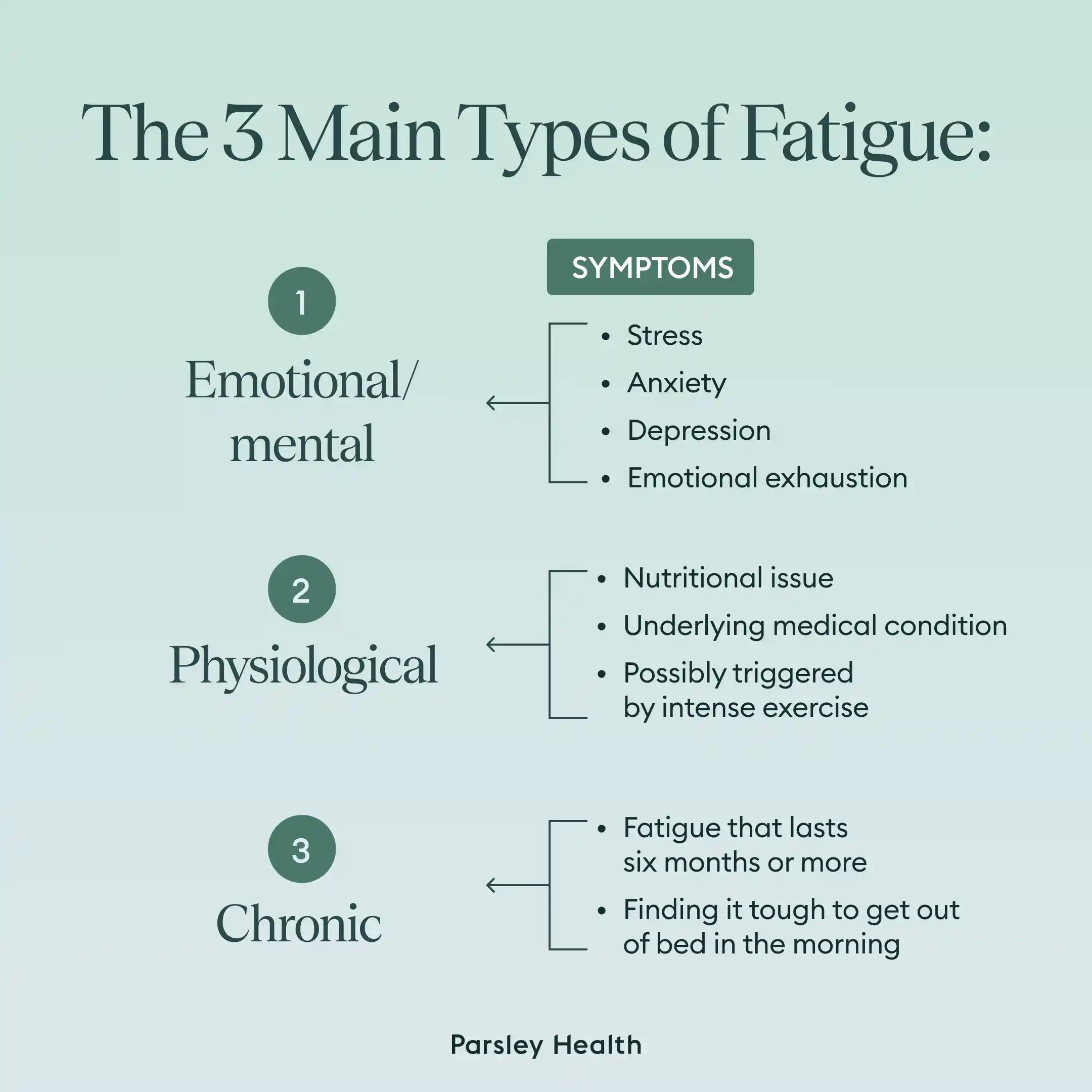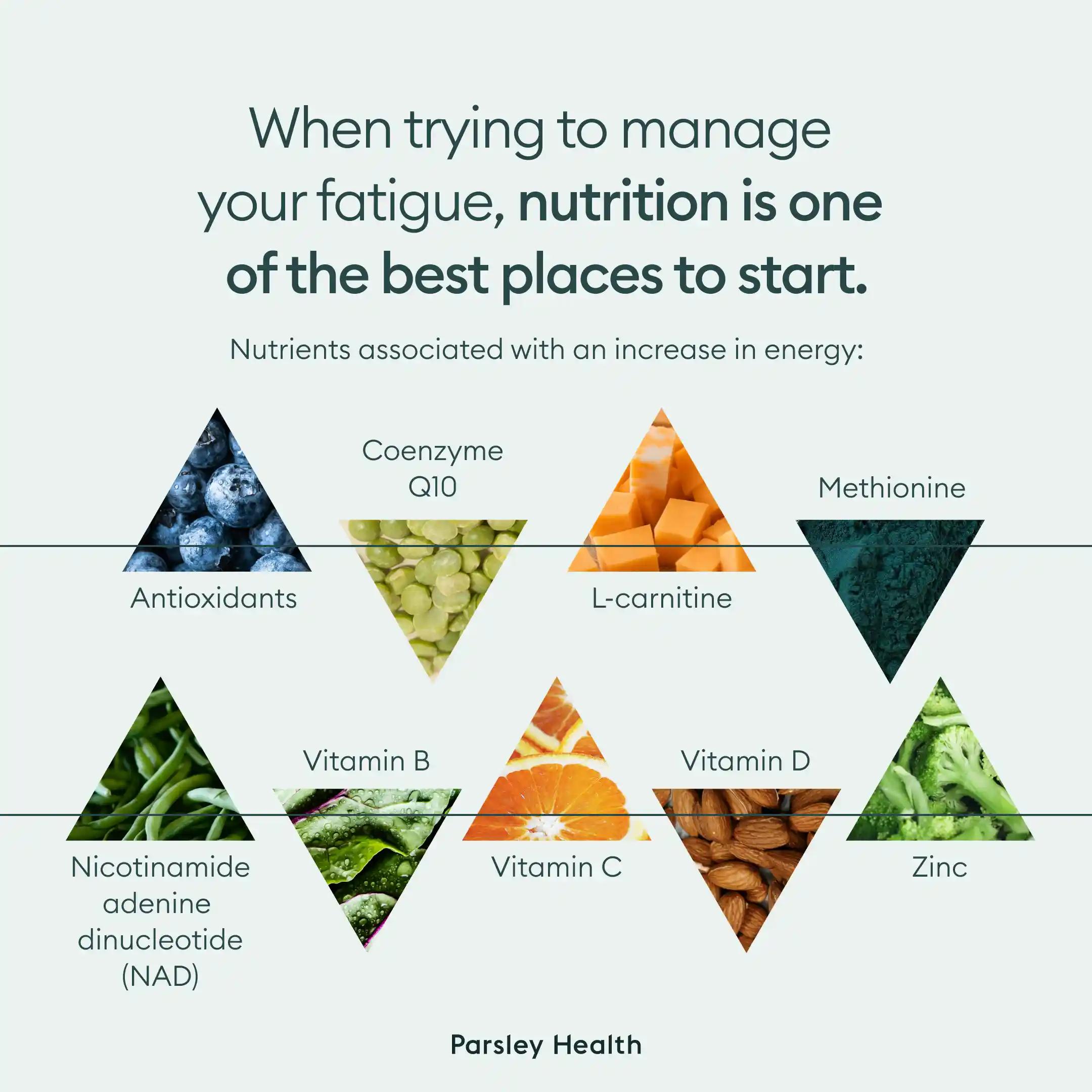Basic fatigue management strategies are simple but effective. They work whether fatigue is a standalone phenomenon or accompanied by other symptoms, like dizziness and cognitive problems. The most effective ones involve your diet, physical activity level, and lifestyle.
We all feel fatigued occasionally, which isn’t always bad. Fatigue, marked by a lack of energy, can be a sign that you just completed a hard workout, your body is fighting a cold, or you’ve had a few tough weeks at work. Other times, it’s a sign of a more persistent problem, such as an autoimmune condition or chronically high levels of stress.
No matter what is causing your fatigue or whether you experience it every once in a while or constantly, it’s good to have some tried-and-true basic fatigue management techniques in your back pocket, regardless of what’s causing your low energy levels. Of course, fatigue is different for everyone and these practices can be customized to your lifestyle.
Understanding fatigue
“Fatigue is a complex and multifaceted condition characterized by an overwhelming sense of tiredness, lack of energy, and reduced capacity to perform daily activities,” says primary care physician Resham Uttamchandani, MD. Dr. Uttamchandani adds that fatigue can manifest as mental, physical, and emotional symptoms, and often has a big impact on someone’s overall quality of life.
Fatigue, however, is different from feeling tired, which often disappears with adequate sleep. Dr. Uttamchandi explains, “Fatigue can persist even after adequate sleep and may be accompanied by other symptoms, such as cognitive dysfunction, mood disturbances, and decreased motivation.”
There are three main types of fatigue, all ofwhich have different root causes and symptoms to understand:

- Physiological fatigue: This can be due to a problem with your nutrition or an underlying medical condition that’s draining your energy (an autoimmune disorder, for example, or anemia). If your physiological fatigue turns out to be temporary, it could have even been triggered by intense exercise.
- Mental or emotional fatigue: This is fatigue that’s caused by stress, anxiety, depression, or emotional exhaustion. If you’re overworked or exhausted from a relationship that isn’t working out, for example, you may experience this type of fatigue.
- Chronic fatigue: This is a serious and long-term type of fatigue that lasts six months or more and can be difficult to treat. Those with chronic fatigue often find it tough to even get out of bed in the morning.
No matter what type of fatigue you’re experiencing, an underlying medical condition or something else in your lifestyle may be to blame. Fatigue is our body telling us it’s time to hit the brakes, make lifestyle changes, and/or seek medical attention.
Symptoms and signs of fatigue
Fatigue, as opposed to sleepiness, is a symptom of an underlying medical condition or something in your lifestyle that is draining your energy. Sometimes, it’s a normal response to intense physical activity or short-term boredom. Other times, it can last weeks or months, indicating that something more serious is at play.
In more severe cases, fatigue may be accompanied by:
- Memory or cognitive problems
- Joint or muscle pain
- Sore throat
- Digestive issues
- Allergies and food sensitivities
- Feeling dizzy, faint, or lightheaded when you stand up
- Difficulty sleeping
- No longer being able to do the activities you used to enjoy
Causes of Fatigue
“Fatigue often results from an interplay of various factors, including lifestyle choices, emotional well-being, and environmental influences,” says Dr. Uttamchandani. The most common factors include: short-term occurrences that drain our energy, lifestyle choices, or a medical condition. But don’t let that short list fool you: fatigue is very complex.
A one-time occurrence could be an over-scheduled week at work or a spate of over-exercising. These short-term triggers can lead to temporary fatigue and don’t usually require medical treatment, though fatigue management practices may help you recover better and faster.
Lifestyle choices, on the other hand, are repetitive triggers for fatigue. If that busy week at work turns into a busy quarter, that stress could be a lifestyle factor that influences your energy levels long-term. Similarly, not reserving time to move your body or consistently choosing processed foods over whole foods are two other lifestyle choices that may make you feel fatigued.
Medical conditions that can cause fatigue include, but are not limited to:
- Anemia
- Anxiety
- Autoimmune conditions
- Depression
- Diabetes
- Chronic obstructive pulmonary disease (COPD)
- Heart disease
- Infections
- Liver and kidney diseases
- Parkinson’s disease
- Thyroid conditions
- Sleep disorders, including sleep apnea and insomnia
- Stroke
Certain medical treatments, like chemotherapy or antidepressants, may also cause fatigue. When you’re recovering from a major surgery, you may experience fatigue as well.
To find the cause of fatigue, a functional medicine practitioners conduct thorough assessments to uncover the underlying factors contributing to fatigue. They will usually begin with a comprehensive assessment of your medical history, including past illnesses, infections, traumas, and environmental exposures. This assessment will also detail lifestyle factors that can influence fatigue, like diet, sleep patterns, stress levels, and physical activity.
Based on this assessment, they may order advanced laboratory testing. Common tests include:
- A complete blood count (CBC) to screen for anemia, infections, and nutritional deficiencies
- A comprehensive metabolic panel (CMP) to assess blood glucose, electrolytes, liver, and kidney function
- Thyroid panel to evaluate thyroid function
- Iron panel to diagnose iron deficiency and anemia
- Hemoglobin A1c (HbA1c) to monitor blood sugar levels
- Cortisol testing to evaluate stress response and adrenal function
- Micronutrient evaluation to identify vitamin and mineral deficiencies
- Food sensitivity testing to uncover potential dietary triggers
You most likely won’t have to go through all these tests as a functional medicine provider can point out the ones that are most useful to your specific situation.
Not sure what your symptoms are really telling you?
The Parsley Symptom Index helps connect the dots across your whole body so you can understand patterns, not just isolated symptoms.
Nutrition and energy
When trying to manage your fatigue, nutrition is one of the best places to start. In a 2023 study, researchers found certain vitamins and minerals decreased feelings of fatigue in those with (and without) chronic conditions.
“Implementing a balanced diet is crucial,” says psychiatrist Ralph Waldo, MD. He recommends adding foods that are high in antioxidants, such as blueberries, legumes, nuts, and leafy greens.

Nutrients associated with an increase in energy and a decrease in fatigue include:
- Antioxidants: Antioxidants can regulate energy use, meaning they can help address the lack of energy associated with fatigue. Foods high in antioxidants include blueberries and leafy greens.
- Coenzyme Q10: This fat-soluble vitamin supports the activity of the mitochondria, the powerhouse of the cell. It’s found in legumes and oils, such as olive and coconut oil.
- L-carnitine: Derived from amino acids, L-carnitine is essential for energy production. It’s found in, but not limited to: cheddar cheese, beef, and asparagus.
- Methionine: This micronutrient can also be found in amino acids. It’s abundant in many seeds and in spirulina, as well as in many dairy and animal products.
- Nicotinamide adenine dinucleotide (NAD): This coenzyme is crucial for metabolism. It’s found in many fruits, vegetables, cow milk, and meat.
- Vitamin B: These vitamins help the body produce energy from the food you eat. The group includes Vitamins B1, B2 B3, B5, B6, B7, B12, and folic acid. Leafy greens, eggs, and beans are often high in B vitamins.
- Vitamin C: These physiological antioxidants can help fend off fatigue, among other health benefits. They are found in many fruits and veggies, including bell peppers, brussels sprouts, oranges, spinach, and cauliflower.
- Vitamin D: This fat-soluble vitamin is essential for healthy cell growth, alongside other health benefits. Direct exposure to sunlight is an excellent source of Vitamin D, as are certain foods, such as cod, trout, and almonds.
- Zinc: This mineral is essential to cellular metabolism, a process that helps manage your energy levels, among other functions. Greek yogurt, pumpkin seeds, and broccoli are all high in zinc.
If someone doesn’t get enough of these nutrients from their diet or their gut cannot absorb nutrients, supplements are a great option—as well as a visit to a functional medicine provider, if experiencing the latter. Before purchasing a supplement, however, it’s best to discuss your options with a functional medical provider. They can help determine which supplements have clean ingredients and are right for your specific needs.
Dr. Waldo also adds that fatigue can be managed via blood sugar stabilization. Managing blood sugar often boils down to eating balanced meals, which include vegetables and protein, and are not too carb-heavy. Eating at regular times and not skipping meals can also help.
Physical activity and energy levels
Physical activity and fatigue have a complicated relationship. Sometimes, intense physical activity leads to fatigue—and this isn’t a bad thing every once in a while. It only becomes a problem if you feel fatigued day in and day out due to over-exercising.
But while a 20 mile run may leave you feeling fatigued for a couple days, light and moderate exercise can decrease fatigue and boost energy. Walking, yoga, pilates, and cycling all fall under the “light to moderate” umbrella. More intense exercises, like running or CrossFit, may be considered moderate when you don’t push yourself for every workout and have a higher level of base fitness.
A good way to incorporate more intense physical movement without feeling fatigued is to follow the 80/20 rule: 80% of your workouts should be in the light to moderate zone, 20% should be more intense. Even elite marathon runners run 80% of their runs easily, and 20% at a more rigorous pace.
But you don’t have to train for a marathon in order to get the benefits of physical activity; small, manageable workouts can effectively fight fatigue and build your fitness. “Consistency in activity, even in small doses, can significantly build endurance over time,” adds Dr. Waldo.
Sleep and relaxation
Sleep won’t solve all types of fatigue, but it may help boost energy levels and decrease fatigue-related responses, like slow cognitive function. The recommended amount of sleep depends on your age and medical history, but it’s usually between seven to nine hours for most adults.
Similarly, calming the brain through relaxation techniques may also help fight fatigue. Stress can cause mental fatigue, meaning that when we lower stress levels, we can better manage fatigue. “Techniques such as progressive muscle relaxation or breathing exercises have been beneficial for my patients in breaking the cycle of stress and fatigue, promoting more restful sleep and a refreshed awakening,” says Dr. Waldo.
Working with a mental health provider can help you dive deeper into relaxation techniques and customize them for your specific situation. However, there are free resources to get started, such as this guided progressive muscle relaxation video from the American Lung Association or Headspace’s guide to box breathing.
Healing stories from our members
Lifestyle changes
Sleep, nutrition, and movement are three staples of fatigue management—and a healthy lifestyle in general. But they aren’t the only lifestyle factors that influence fatigue levels. Drinking too much alcohol, other substance use, and even too much caffeine have also been linked to fatigue.
We’re not saying you need to cut out all happy hours and your morning coffee. Instead, if you do drink alcohol and/or caffeine, consume them in moderation. For alcohol, the CDC recommends no more than one drink per day for women and two drinks per day for men.
For caffeine, the earlier you drink, the better. At minimum, all caffeine should be consumed eight hours before you sleep. If you go to bed at 11pm, for example, stop drinking coffee around 3pm at the latest.
Your job may also impact your fatigue levels. When you’re fatigued due to concerns at work, it’s referred to as worker fatigue. This type of fatigue is often associated with unpredictable shifts, and stressful or hot work environments. Many truck drivers also experience driver fatigue due to long hours on the road.
Both worker and driver fatigue can be managed with the sleep, physical activity, and nutrition tips above. If these basic fatigue management strategies don’t work, it may be time to search for a new role. Signs to dust off your resume include feeling constantly fatigued and experiencing related symptoms, such as anxiety, intestinal problems, and cognitive difficulties.
Staying hydrated
If you want to get rid of fatigue fast, it’s tempting to brew another coffee. Instead, consider grabbing a cup of water. In one study, as little as 200 mL of water (about one cup) was enough to manage fatigue in young adults.
While a cup of water can do wonders, regularly staying hydrated can help manage fatigue and energy levels for the long haul. The amount of water you drink daily depends on your gender, age, physical activity level, the temperature, and other factors. That said, four to six cups of water a day is the general minimum recommendation for most adults.
Parsley Health offers physician-led functional medicine care, advanced lab programs, and flexible ways to get started, all designed to help you feel better over time.
Your workplace and home can either induce or fight off fatigue. Consider making a few small adjustments to your office and home to help make them fatigue-free zones.
Promoting a fatigue-free environment at home can look like:
- Keeping the bedroom dark and cool when it’s time to go to sleep
- Laying out your workout clothes the night before so it’s easier to exercise
- Stocking the fridge with whole foods
- Investing in a supplement if you’re experiencing a nutrient deficiency
- Improving the air quality at home
- Checking that mold and other toxins aren’t present in your space
Creating a fatigue-free work environment can be more difficult, since there are systemic issues that may lead to worker fatigue. There are, however, a few actions you can take to control fatigue at work:
- Create an energizing morning routine before clocking in
- Have a cue at the end for the work day, such as shutting off your computer completely or going for a walk
- Take a daily lunch breakwhenever your can
Seeking help
If you’re feeling fatigued after a cross-country drive or after a tough workout, you probably don’t need to seek medical attention. When fatigue becomes chronic or is accompanied by other symptoms (such as dizziness, muscle pains, and headaches), it may be time to talk to a functional medical provider about your management options.
Functional providers can assess the root cause of your fatigue and provide a treatment plan that addresses the lifestyle factors and medical conditions causing fatigue, not just the symptoms themselves.
Final thoughts
These basic fatigue management strategies are widely applicable. But while they can be used for both acute and chronic fatigue, and whether fatigue is a standalone phenomenon or accompanied by other symptoms, there are a few things to keep in mind moving forward:
- Nutrition and physical activity: Eating a well-balanced diet and getting regular physical activity is a recipe for higher energy levels and less fatigue.
- Lifestyle changes: Sometimes, fatigue is caused by lifestyle factors, such as clocking too many hours at work or not getting enough sleep. Auditing your lifestyle and where you could add energy-boosting routines can help.
- Seek support: While these fatigue management techniques are effective, they shouldn’t be your only line of defense against more chronic fatigue. Don’t be afraid to seek out help.
When fatigue won’t go away, a functional medical provider can get to the bottom of what’s causing your symptoms. Parsley Health regularly helps individuals who are experiencing persistent fatigue. Our approach includes finding the root cause and creating a personalized plan that includes fitness, diet, supplements, stress management, and medications, when necessary.
Frequently asked questions (FAQs)
What is the fastest way to cure fatigue?
The fastest way to cure fatigue often depends on what’s causing you to feel fatigued in the first place. That said, some quick ways to boost energy levels include drinking a glass of water, grabbing a healthy snack, like nuts or carrots, or practicing a relaxation technique like box breathing.
How to manage fatigue levels?
Managing fatigue levels often boils down to eating a nutrient-rich diet, exercising regularly, getting seven to nine hours of sleep per night, and managing your stress levels. That said, sometimes a medical condition, surgery, or medicine can cause fatigue as well. When this is the case, speak to a functional medical provider about how to address the root cause.
How to cope with extreme fatigue?
Extreme fatigue can be difficult to cope with on your own. Often, it’s best handled with input from a functional medicine provider who can address your fatigue and the root cause. In the meantime, some actions you can take to manage extreme fatigue include regularly practicing relaxation and stress relief techniques, resting when you need to, and moving your body in low-intensity ways, such as walking or cycling.
What are the 5 “P”s of fatigue?
The 5 “P”s of fatigue are five ways to make the most of the energy you have. They include prioritizing, planning ahead, pacing yourself, positioning, and permission. Prioritizing means allotting the energy you do have to the most important tasks. This is often supported by planning ahead, so you can accomplish high-energy tasks when you have the most energy. Pacing yourself involves working or moving in a slow and steady way, instead of in intense outburst. Positioning means doing whatever you can in a low-energy position, such as sitting or lying down. Permission equates to giving yourself permission to rest when you need it.









